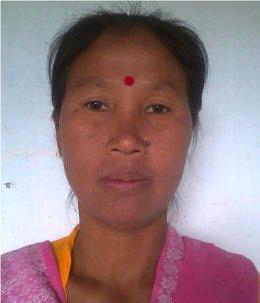Christen Narazary belongs to the tribal Bodo Community in Kharjaigun village of Sonapar District in India. She is a hardworking and intelligent woman who has been educated until Grade IV. She was married off to another community and has two daughters. Christen was a traditional weaver, but she found a job as a tailor in a small organization.
In 2000, she returned to her traditional roots and started doing weaving work at KVA. Now, weaving is her sole source of livelihood and KVA ensures that she gets weaving projects throughout the year. Her interest in learning new things and tendency to experiment with designs and various items have lead Christen to being totally independent.
Christen’s husband Ratan, who is a tailor, has also became involved in the readymade garment microenterprise of KVA. Since both of them are associated with KVA, they get regular business throughout the year which is sufficient to sustain their livelihood.
Members like Christen contributes majorly towards the strengthening of the objectives of SEWA; and KVA shall continue to strive towards developing their skills and illuminating their lives with knowledge.
Established in 1986, the Kokila Vikas Ashram (KVA) operates on the lines of Gandhian principles and values on rural development, livelihood opportunities, employment generation and self-reliance. The organization aims socio-economic transformation by creating awareness, capacity building, organizing the rural people, skills training of youth and women, and educating the children. KVA works in Gahpur Sub Division of Sonitpur Districts and focuses on the empowerment of the Boro Tribal Community living in the North Bank of Bhramaputra. KVA is one of the farmer organizations under the MTCP2 Programme in India.
SEWA is a member of the Asian Farmers’ Association and is also the national implementing agency of the MTCP2 Programme in India.
About MTCP2
The Medium Term Cooperation Program Phase 2 (MTCP2), a five-year capacity building program supported by the International Fund for Agricultural Development (IFAD), the Swiss Agency for Development and Cooperation (SDC), and the European Union (EU), has been implemented in 19 countries across three sub-regions—Southeast Asia, South Asia, and the Pacific—engaging 1,544 sub-national farmers organizations (FOs) with a total membership of around 22 million farmers. The funding support (total budget of $ 5 million for the whole duration of the project across 19 countries) serves as a catalytic fund that will allow FOs to enhance their capacity to be effective channels of economic services to farmers. So far, the program has contributed to the formation of strong national platform of FOs with improved capacity to engage in policy processes and mobilize resources from mainstream agricultural development programs like extension services, credit, and pre and post harvest facilities. The program also helped in transforming farmers associations into commodity-based cooperatives to strengthen the role of small-scale farmers within an inclusive and sustainable value-chain. The program is being implemented by the consortium Asian Farmers’ Association for Sustainable Rural Development (AFA) and La Via Campesina (LVC).




Comments are closed